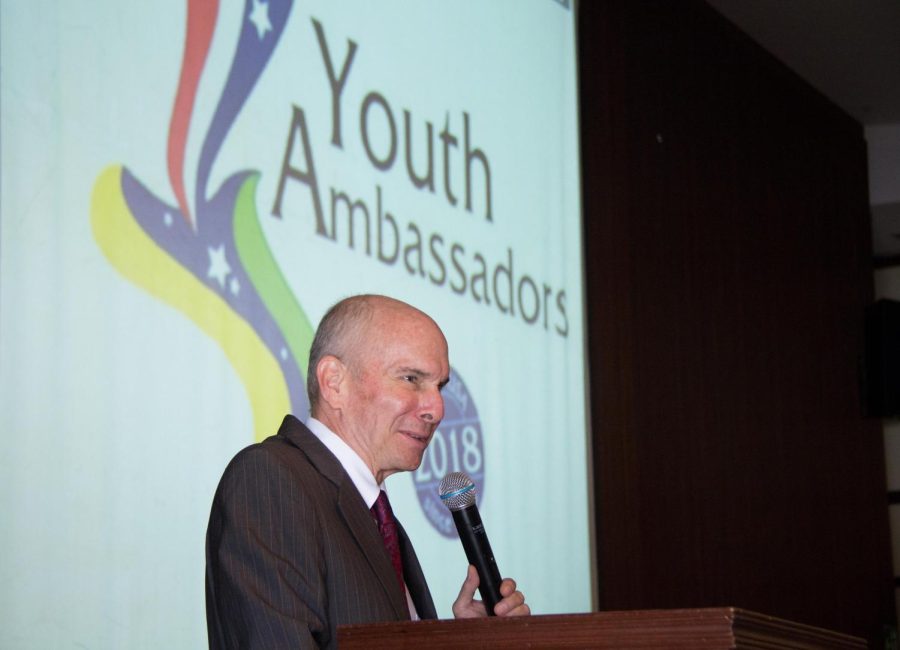Q&A: Former U.S. ambassador visits Mayfield High School
Former United States ambassador Michael McKinley speaks at a conference on Jan. 10, 2018. McKinley visited Mayfield High School last week to discuss his experiences with sophomores in Mr. Hughes’ AP World History class.
October 3, 2022
In an exclusive interview with The Paw Print’s Victoria Januszewski, former United States ambassador Michael McKinley discusses his experiences traveling to schools today. He was a four-time ambassador serving in Peru (2007-2010), Colombia (2010-2013), Afghanistan (2014-2016), and Brazil (2017-2018).
Victoria: Where are some of the different places you have gone to share your experiences with others?
McKinley: Since I came back to the United States in 2018, I’ve been very fortunate in that world affairs councils, student groups, and different parts of the country have reached out to me. It’s been really an extraordinary experience to travel to Montana, North Carolina, speak during the COVID pandemic on zoom with audiences and the west coast and New England, and the central part of the United States about international issues. I’ve learned a tremendous amount and the key takeaway I have is how encouraging it is that so many young people are interested in what is happening outside of our borders because the world is so important to the United States and its important for the next generation to have invested interest in it.
Victoria: Why do you enjoy talking to others about your time as a U.S. ambassador?
McKinley: I get the stimulation, particularly from younger audiences of unexpected questions. Challenges to the way I think, it’s very simple to begin to believe your own presentation, your own line of thinking, and by engaging with different audiences, it makes you think about what they care about, what they’re interested in, and I’ll repeat [myself], it challenges your assumptions and it keeps you fresh.
Victoria: What do you hope others gain from your talks?
McKinley: I do not presume [anything]. The fact is I am humbled by the fact that anyone would want to listen to me. Having the opportunity to speak, since I have worked in so many different parts of the world, I speak about many different things; and I don’t know what part interests one person or another, [so] what I hope at the end of the hour or the presentation or the discussion people take away is how big, complex, and interesting, the world is, and how important it is for the United States to engage in that world.
Victoria: How have your experiences as a US ambassador opened up other career opportunities for you?
McKinley: The short answer on that is there are ambassadors who are appointed by the president who are friends of the president or who supported the president’s campaign. Then there are the career professionals – the diplomats who spent 20-30 years building up the skillset inside the state department to become ambassadors. The political ambassadors return to the fields they came out of, whether it’s business, academia, politics. Career ambassadors tend to serve other options that are less glamorous but are still very interesting sort of changes going forward. First, it’s working with universities with educational institutions, either teaching about foreign policy, lecturing about their experiences, engaging with students, and I think many of us take that course because it is fulfilling and something that flows naturally from what we’ve done. The second area where career ambassadors can engage is supporting non-governmental organizations groups that work like Save the Children, World Wildlife Fund, and so on, who work in different aspects of trying to help people around the world. Then the third area is business. The United States has many major corporations that are household names around the world but they didn’t get there simply because their product is terrific. They have to invest in the environment they’re trying to sell to. They need to understand it; they need to work it. The world is full of different regulations, different ways of doing trade and investment and so many career ambassadors have something to offer companies or consultants who work in the international business arena and trying to decipher what’s happening in different countries around the world, different markets, what the politics are like, maybe understanding what’s happening in their economies there, maybe help in sort of presenting themselves giving them advice on how to work the environments they’re investing in. I think in broad terms those would be the three areas I would think career people would gravitate towards.
Victoria: Thank you for your time!






















































